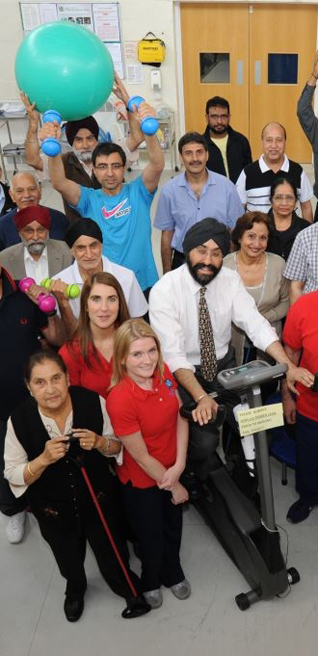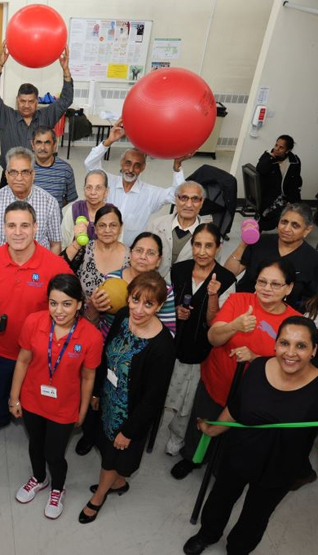People
Arming Against a Killer:
Heart Disease
GURMUKH SINGH [United Kingdom]
Prevention is better than cure.
And prevention after the cure can be equally beneficial ... and it saves millions in National Health Service costs.
I am told that Southall / Ealing (UK) is probably the epicentre of the heart disease amongst Sikh-Britons and other Asians.
Ealing Hospital’s Cardiac Rehabilitation Exercise Programme, led by Sikh-Briton Dr Amarjit Singh Sethi has been an outstanding success.
It is just the right place for running such a pilot exercise programme for those like me who have survived their first heart problem.
The certificate which I received after attending the 8-week Cardiac Rehabilitation Exercise Programme confirmed my “increased knowledge and skills on exercising safely and effectively”.
I thought I needed no such guidance, but I was wrong!
With a changed life-style there is less chance of a heart attack and one can live a reasonably active life. The problem is that the continuity of this programme remains in funding doubt.
With long walks and some hill climbing behind me, including a car trip only two years before over the highest passes in the world to Leh in Ladakh, the Buddhist part of Kashmir, I woke up on New Year’s Day last year to find that I could hardly walk about 200 yards without stopping, due to chest pain.
I just could not believe that I had angina and wasted five days before seeing a doctor. Then, on to angioplasty in March 2013.
I was told that the pilot exercise programme was given the funding green light from July 2013 for one year. According to a senior staff member, “We proposed a bespoke idea to hold an exercise class tailored to the need of our local community. We were successful in our proposal and received funding for one year.
Of the population of Ealing of 350,000, 40% have a back-ground rooted on the subcontinent. Since the main non-English languages spoken here are Punjabi, Urdu, Hindi and Gujarati, a translator is present, especially during the exercise classes.
According to Olivia Molloy, the lead cardiac rehabilitation nurse, “This is an effort to improve patient experience and patient empowerment through greater awareness of their long term condition. We as a service believe that this unique multi-cultural client-centred approach is in the best interest of our local community.”
Being a bit sceptical at first, I joined this programme rather belatedly, in April this year.
I am glad that I did.
After the initial medical assessment, the twice weekly group sessions under safe medical supervision, with pre and post exercise blood pressure measurements, etc., taught us a disciplined approach to exercise.
Led by Amir Zamani, cardiac rehabilitation exercise specialist, with Nav Kaur Bhogal, a youngish Sikh girl translator (also studying for a post graduate degree), joining in, we had great fun exercising to lively bhangra music put on by Nav. Olivia would jump in from time to time to cheer us up.
She always thought that “Mr Singh” looked too serious.
Most of the exercise equipment used would be either available in most homes, or purchased at little cost. Each session concluded with floor-mat exercises during which, at the end, all would lie flat on their backs in a totally relaxed state as young Nav would read a soothing, uplifting passage whispered in a soft voice.
This was a mixed diverse group and all got on well with each other. I made a couple of Muslim friends who spoke fluent and better Punjabi than me.
The staff participants, Olivia and her colleague Jo Evans (both cardiac rehab nurses), the friendly and ever smiling Middle Eastern Amir Zamani, and, of course, Nav (our translator and music player) related well to the older participants.
In the background were Baldeesh Rai (cardiac dietician), Penny Chew (“Stop Smoking” advisor) and Adrian Jugdoyal (alcohol clinical specialist.)
An absolutely wonderful team led by Dr Amarjit Singh!
Each session lasted about an hour and a half. As I live only about a mile from the hospital I used to walk and get the extra exercise. The waistline improved and I felt and looked good.
That was also the feedback from the other participants put on the right track for maintaining good health.
Heart disease is on the increase. Regrettably, most of us are not in a learning mode regarding exercise and change in life-style; that is, not until the first heart problem hits us … such as a heart attack.
If one is lucky enough to survive that, then the need is for timely and practical guidance; which only such rehabilitation programmes can provide through group learning.
The rationale for funding these programmes has to be made and assessed on the basis of long term returns for the communities in the plural societies we live in.
August 13, 2014
Conversation about this article
1: Baldev Singh Dhaliwal (Adelaide, South Australia), August 15, 2014, 2:44 AM.
Although the title makes reference particularly to heart disease, to me it is more than that. To me it is people from diverse but related backgrounds coming together to engage in fun activities leading to a healthy lifestyle and perhaps taking the first step towards changing attitudes. Benefit of this should not be underestimated. I was a community worker for the diverse cultures in the multicultural community in South Australia for many years. As such I was in a position to encourage health and other community related initiatives. My experience is that targeted community programs, especially for those people who are unable to relate (reasons can be many) to the main stream programs, are almost essential not only for direct benefits to the participants but also community education in changing attitudes and lifestyles. Healthy life styles (in body and mind) on the long term can only benefit the country in reducing health costs. Being closely involved in the Sikh community (in all its diversity) for many years now, the last thing on their mind is their health or consideration of the life styles they lead, they have more important things to do! This article may be a timely reminder for them to reassess their priorities! True, "The rationale for funding these programs has to be made and assessed on the basis of long term returns for the communities in the plural societies we live in." And Sikhs should be in the forefront supporting and encouraging them and convincing the funding bodies that cutting such programs would be false economy!
2: Harbans Gill (Australia), August 15, 2014, 10:10 AM.
Wonderful reading Gurmukh's article and Baldev's comments.
3: Dya Singh (Melbourne, Australia), August 15, 2014, 10:14 PM.
Health, is an issue which is not promoted in the worldwide Sikh community, other than our in-fighting on 'maas maas kar murakh jhuggeray' (Meat or not to meat, we fight on like idiots when greater issues need to be addressed.) One such issue is the collective community's health. Gurmukh Singh ji's short article is a timely reminder when heart problems, cholesterol, diabetes and blood pressure are some of our community's greatest killers. Yes, those close to Gurmukh Singh ji always chide him for being overly serious. Nice to see him with a smile with a huge ball in his hands in the picture. He is always overly preoccupied, having retired from 'work', with 'Sikh' issues and can get quite worked up about them. I always say - take all that with a pinch of salt ... well, perhaps not with salt(!). My headmaster from school days in Malaysia, Mr. Murugasoo, who I met at a recent reunion, looking sprightly at just over 80 after a heart attack, commented to me that perhaps everyone should get a heart attack after 60, 'so that we can start taking our health seriously while taking life less seriously and enjoying the days we have left'. Finally, gurdwaras, the hub of our spiritual and social life, should seriously promote health by perhaps creating gyms, 'walks' around the gurdwara premises, supporting health, diet advice and other exercise initiatives and ensuring that langar is of the healthy variety. Dare I also add, that perhaps some of our simran and nitnem should be recorded with aerobics exercises! Our Japji Sahib and Jaap Sahib was recorded with exactly that in mind and friends use them when they climb onto their treadmills every morning ...
4: T. Sher Singh (Mount Forest, Ontario, Canada), August 15, 2014, 11:07 PM.
I can personally attest to Dya's final words in the last comment. There's indeed no better music to exercise by than his wonderful rendition of Jaap Sahib sung to a Rap beat!
5: Manbir Singh (Ludhiana, Punjab), August 15, 2014, 11:40 PM.
We Punjabis have a close association with heart diseases and related conditions. We are seeing more and more young ones coming in contact with Diabetes, Lipid disorders and Hypertension which lead to early onset of Coronary Heart Disease. The dietary habits for which Punjabis are famous for is showing their colours and it is the reason for our health related problems. No surprise why all the corporate entities in the health business are rushing to create setups in Punjab. Dya Singh's advice that gurdwaras, the hub of our spiritual and social life, should seriously promote health needs to be taken seriously. This would also leave us with less time for other distractions, such as getting into conflict and arguments.
6: Baldev Singh (Bradford, United Kingdom), August 16, 2014, 10:56 AM.
Walking is the best exercise you can ever get and it is the cheapest form of transport!... The Great Guru Nanak ... our Guru Nanak and the whole world's Guru Nanak ... walked everywhere to spread the universal message of Oneness and a fine balance in everything in life.
7: Mohinder Singh Chahal (Hayes, England), August 17, 2014, 1:32 PM.
I was surprised when Sardar Gurmukh Singh ji disclosed that he had a heart attack last year. His two brothers from Australia I know personally. I would love to acquire Dya Singh`s CDs on Jaap Sahib. Where can I get more info on the course. I had a pacemaker fitted on 11 July 2014 at Hammersmith Hospital. I am looking for such a regimen.




